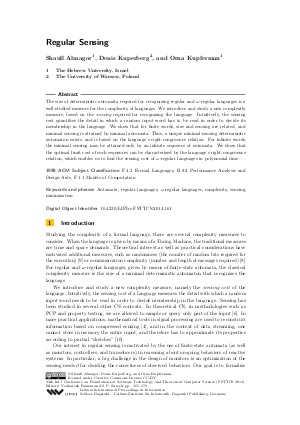Regular Sensing
Authors Shaull Almagor, Denis Kuperberg, Orna Kupferman
-
Part of:
Volume:
34th International Conference on Foundation of Software Technology and Theoretical Computer Science (FSTTCS 2014)
Part of: Series: Leibniz International Proceedings in Informatics (LIPIcs)
Part of: Conference: IARCS Annual Conference on Foundations of Software Technology and Theoretical Computer Science (FSTTCS) - License:
 Creative Commons Attribution 3.0 Unported license
Creative Commons Attribution 3.0 Unported license
- Publication Date: 2014-12-12
File

PDF
LIPIcs.FSTTCS.2014.161.pdf
- Filesize: 482 kB
- 13 pages
Document Identifiers
Subject Classification
Keywords
- Automata
- regular languages
- omega-regular languages
- complexity
- sensing
- minimization
Metrics
- Access Statistics
-
Total Accesses (updated on a weekly basis)
0PDF Downloads0Metadata Views
Abstract
The size of deterministic automata required for recognizing regular and omega-regular languages is a well-studied measure for the complexity of languages. We introduce and study a new complexity measure, based on the sensing required for recognizing the language. Intuitively, the sensing cost quantifies the detail in which a random input word has to be read in order to decide its membership in the language. We show that for finite words, size and sensing are related, and minimal sensing is attained by minimal automata. Thus, a unique minimal-sensing deterministic automaton exists, and is based on the language's right-congruence relation. For infinite words, the minimal sensing may be attained only by an infinite sequence of automata. We show that the optimal limit cost of such sequences can be characterized by the language's right-congruence relation, which enables us to find the sensing cost of omega-regular languages in polynomial time.
Cite As Get BibTex
Shaull Almagor, Denis Kuperberg, and Orna Kupferman. Regular Sensing. In 34th International Conference on Foundation of Software Technology and Theoretical Computer Science (FSTTCS 2014). Leibniz International Proceedings in Informatics (LIPIcs), Volume 29, pp. 161-173, Schloss Dagstuhl – Leibniz-Zentrum für Informatik (2014)
https://doi.org/10.4230/LIPIcs.FSTTCS.2014.161
BibTex
@InProceedings{almagor_et_al:LIPIcs.FSTTCS.2014.161,
author = {Almagor, Shaull and Kuperberg, Denis and Kupferman, Orna},
title = {{Regular Sensing}},
booktitle = {34th International Conference on Foundation of Software Technology and Theoretical Computer Science (FSTTCS 2014)},
pages = {161--173},
series = {Leibniz International Proceedings in Informatics (LIPIcs)},
ISBN = {978-3-939897-77-4},
ISSN = {1868-8969},
year = {2014},
volume = {29},
editor = {Raman, Venkatesh and Suresh, S. P.},
publisher = {Schloss Dagstuhl -- Leibniz-Zentrum f{\"u}r Informatik},
address = {Dagstuhl, Germany},
URL = {https://drops.dagstuhl.de/entities/document/10.4230/LIPIcs.FSTTCS.2014.161},
URN = {urn:nbn:de:0030-drops-48409},
doi = {10.4230/LIPIcs.FSTTCS.2014.161},
annote = {Keywords: Automata, regular languages, omega-regular languages, complexity, sensing, minimization}
}
Author Details
References
-
S. Almagor, U. Boker, and O. Kupferman. Discounting in LTL. In TACAS, Lecture Notes in Computer Science. Springer, 2014.

-
K. Chatterjee and R. Majumdar. Minimum attention controller synthesis for omega-regular objectives. In FORMATS, pages 145-159, 2011.

-
K. Chatterjee, R. Majumdar, and T. A. Henzinger. Controller synthesis with budget constraints. In HSCC, volume 4981 of Lecture Notes in Computer Science, pages 72-86. Springer, 2008.

-
D. L. Donoho. Compressed sensing. IEEE Trans. Inform. Theory, 52:1289-1306, 2006.

-
C. Grinstead and J. Laurie Snell. Introduction to Probability, chapter 11 (Markov Chains), pages 405-470. American Mathematical Society, 1997.

-
G. Kindler. Property Testing, PCP, and Juntas. PhD thesis, Tel Aviv University, 2002.

-
O. Kupferman and M. Y. Vardi. Church’s problem revisited. The Bulletin of Symbolic Logic, 5(2):245 - 263, 1999.

-
E. Kushilevitz and N. Nisan. Communication complexity. Cambridge University Press, 1997.

-
C. Mauduit and A. Sárköz. On finite pseudorandom binary sequences. i. measure of pseudorandomness, the legendre symbol. Acta Arith., 82(4):365-377, 1997.

-
S. Muthukrishnan. Theory of data stream computing: where to go. In Proc. 30th Symposium on Principles of Database Systems, pages 317-319, 2011.

-
D. Niwinski and I. Walukiewicz. Relating hierarchies of word and tree automata. In STACS, volume 1373 of Lecture Notes in Computer Science. Springer, 1998.

-
S. Schewe. Beyond Hyper-Minimisation - Minimising DBAs and DPAs is NP-Complete. In FSTTCS, volume 8 of Leibniz International Proceedings in Informatics (LIPIcs), pages 400-411, 2010.

